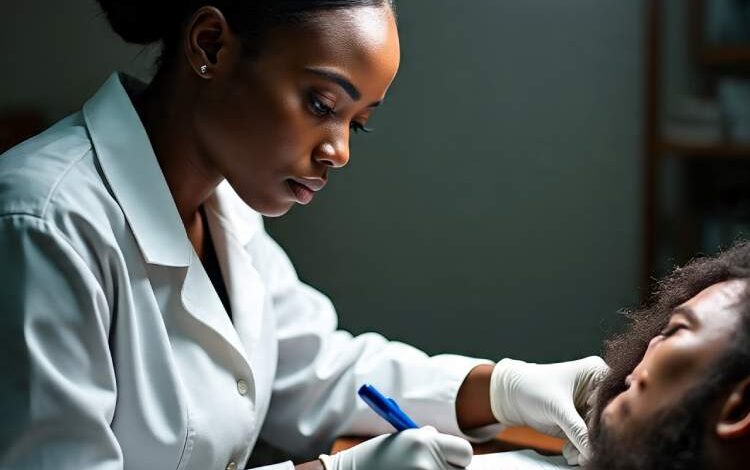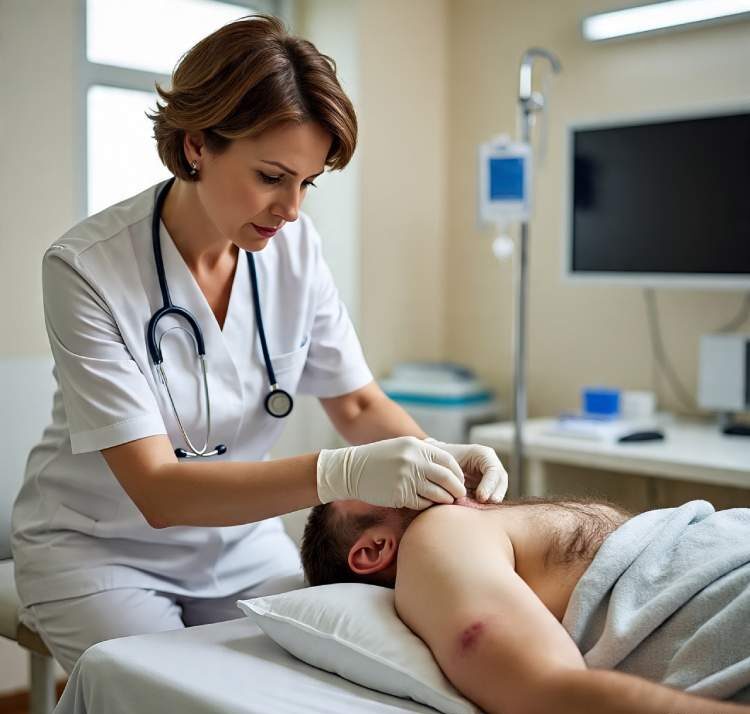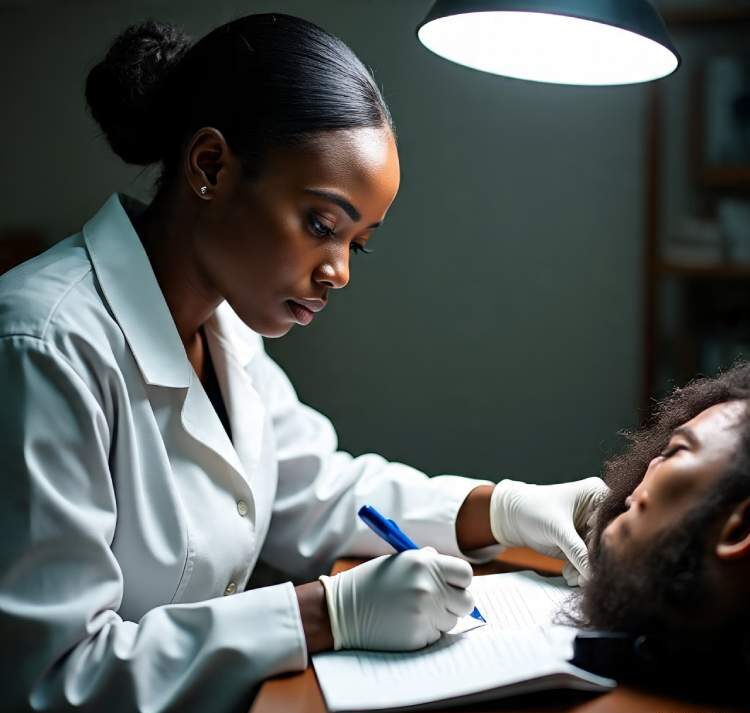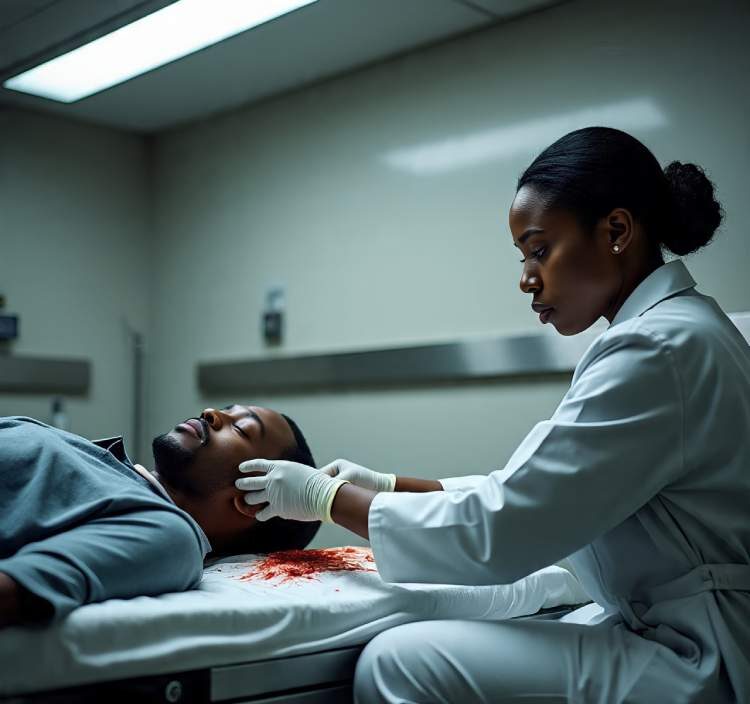How to become a forensic nurse in 2025 with fast certification and high-paying jobs – Ultimate Career Guide
What Is Forensic Nursing?

Wondering how to become a forensic nurse in 2025 with fast certification and land a high-paying job? You’re in the right place. Forensic nursing is one of the most rewarding and rapidly growing specialties in healthcare, offering nurses the unique opportunity to combine medical expertise with legal justice. Whether you’re a recent nursing graduate or a practicing RN ready to level up your career, this ultimate guide will walk you through everything you need to know—from getting certified quickly to securing top-paying forensic nurse roles in 2025.

As a forensic nurse, you’ll stand at the critical intersection of healthcare and law enforcement—providing trauma-informed care to victims of violence, collecting vital forensic evidence, and even testifying in court. With increasing demand across hospitals, legal systems, and crisis centers, 2025 is the perfect year to enter this powerful and purpose-driven career path.
What Is Forensic Nursing?
Forensic nursing is a specialized area of nursing where medical care meets the legal system. Professionals in this field are registered nurses or advanced practice nurses trained to care for victims of violence and abuse while also collecting and preserving critical evidence for criminal investigations.
Forensic nurses play an essential dual role: they provide compassionate, trauma-sensitive care to patients—often victims of sexual assault, domestic abuse, child or elder mistreatment, or human trafficking—while also gathering physical and testimonial evidence that can be used in legal proceedings. This may include collecting DNA samples, photographing injuries, documenting wounds, and even giving expert testimony in court.
While Sexual Assault Nurse Examiners (SANEs) are the most recognized forensic nurses, the field extends to many high-impact areas such as:
Emergency departments
Correctional facilities
Death investigation units
Disaster response teams
Human trafficking task forces
As more healthcare systems recognize the need for trained forensic professionals, there’s never been a better time to learn how to become a forensic nurse in 2025 with fast certification and gain access to meaningful, high-paying jobs across the U.S. and beyond.
The History and Evolution of Forensic Nursing
To truly understand how to become a forensic nurse in 2025 with fast certification, it helps to explore how this powerful specialty emerged. Forensic nursing is a relatively new field that officially took shape in the early 1990s—but its impact on both healthcare and the justice system has been profound.
The discipline was first introduced in 1992, thanks to the groundbreaking work of two pioneers: Virginia Lynch and Dr. Linda Ledray, who recognized the urgent need for healthcare professionals to preserve evidence while treating victims of violence.
Virginia Lynch – The Founder of Forensic Nursing
Often referred to as the founder of forensic nursing, Virginia Lynch (MSN, RN) was deeply affected by a visit to a crime lab. There, she discovered that doctors and nurses were unknowingly destroying critical forensic evidence, making it harder to bring perpetrators to justice. Her realization led to a lifelong mission to train nurses to protect evidence while delivering trauma-informed care.
Lynch went on to establish the first forensic nursing graduate program and founded the International Association of Forensic Nurses (IAFN) in 1992—laying the foundation for today’s forensic nurse certification programs.
Dr. Linda Ledray – Innovator of SANE Programs
Meanwhile, Dr. Linda Ledray launched the first Sexual Assault Resource Service (SARS) in Minneapolis in 1977—one of the nation’s first Sexual Assault Nurse Examiner (SANE) programs. Her work trained nurses to conduct specialized forensic exams, a practice that became a national model for sexual assault response.

By 1995, the American Nurses Association (ANA) formally recognized forensic nursing as a specialty. The IAFN soon followed with the first SANE certifications and the launch of the Journal of Forensic Nursing, further solidifying the field’s professional standards.
Today, if you’re exploring how to become a forensic nurse in 2025 with fast certification, these milestones make it possible. Thanks to their efforts, streamlined training pathways and online forensic nurse programs are now available across the U.S. and internationally.
Forensic Nursing Specialties in 2025
As you consider how to become a forensic nurse in 2025 with fast certification, it’s important to understand the range of specialized roles available in this evolving field. While the Sexual Assault Nurse Examiner (SANE) remains the most recognized role, there are many exciting, high-paying career paths you can pursue based on your interests and nursing background.
| Forensic Nursing Role | Description |
|---|---|
| Sexual Assault Nurse Examiner (SANE-A / SANE-P) | Certified to assess and treat victims of adult, adolescent, or pediatric sexual assault. Certification is offered by IAFN. |
| Forensic Nurse Death Investigator | Assists medical examiners or coroners in determining cause of death—often involved in suspicious or unattended deaths. |
| Correctional Forensic Nurse | Provides healthcare in jail or prison settings, often dealing with injuries related to violence, abuse, or neglect. |
| Forensic Psychiatric Nurse | Cares for patients in behavioral units, often managing cases related to criminal behavior, assault, or legal competency. |
| Forensic Nurse Educator or Legal Consultant | Teaches forensic nursing in academic settings or provides expert medical-legal testimony in court. |
| Pediatric Forensic Nurse | Focuses on child abuse, neglect, sexual exploitation, or pediatric death investigation cases. |
Some forensic nurses specialize in just one area, while others serve in multiple roles. For example, forensic nurse Jeana Friday explains that her duties go far beyond SANE exams. She regularly performs strangulation assessments, child abuse evaluations, death reviews, and collaborates with law enforcement on domestic violence and human trafficking cases.
This diversity in roles is one reason why so many RNs are eager to learn how to become a forensic nurse in 2025 with fast certification—there are countless ways to make an impact and build a meaningful, well-compensated career.
Where Do Forensic Nurses Work?
If you’re researching how to become a forensic nurse in 2025 with fast certification, it’s important to understand the wide range of environments where forensic nurses apply their expertise. These professionals operate wherever medical care intersects with law enforcement, criminal investigations, or trauma recovery.
In the U.S., most forensic nurses—especially Sexual Assault Nurse Examiners (SANEs)—work in hospital emergency rooms, sexual assault response centers, or trauma units, providing immediate care to victims of sexual violence, domestic abuse, or assault. They may work independently, as part of a coordinated team, or be on-call 24/7 to respond to urgent cases.
But forensic nursing extends far beyond the ER.
Forensic nurses are also employed in:
Domestic violence shelters and elder care organizations
Medical examiner and coroner offices
Psychiatric institutions and correctional facilities
Disaster zones and mass casualty events
Law enforcement agencies and court systems
Some advanced practitioners take on specialized roles such as nurse death investigators, clinical risk managers, or legal nurse consultants, contributing to crime scene investigations, postmortem assessments, or expert legal testimony.
Common Forensic Nurse Work Environments
| Work Environment | Typical Settings | Forensic Nursing Responsibilities |
|---|---|---|
| Hospitals (ER & Trauma Centers) | Emergency departments, women’s health units | Perform SANE exams, treat assault-related injuries, collect physical evidence, and support survivors. |
| Sexual Assault Crisis Programs | Community clinics, rape crisis centers, mobile SANE units | Provide 24/7 forensic care, advocate for victims, preserve the chain of custody, and offer follow-up support. |
| Medical Examiner/Coroner Offices | Autopsy labs, morgues | Assist in postmortem exams, collect evidence, and prepare reports for legal and investigative purposes. |
| Correctional Facilities | Prisons, jails, detention centers | Treat inmate injuries, assess for signs of abuse, and coordinate care in collaboration with correctional officers. |
| Psychiatric Institutions | Forensic mental health units, state hospitals | Evaluate mentally ill patients involved in legal cases, perform trauma assessments, and determine legal competency. |
| Disaster Relief & Mass Casualty Sites | Disaster zones, emergency shelters, field hospitals | Identify victims, conduct forensic triage, preserve evidence under chaotic conditions, and offer crisis care. |
Bridging Healthcare and Justice

As you explore how to become a forensic nurse in 2025 with fast certification, consider that your future workplace might not look like a traditional hospital setting. Forensic nurses bridge the gap between health and justice, whether it’s supporting survivors in the ER, conducting psychiatric evaluations in correctional settings, or serving as expert witnesses in courtrooms.
Some also transition into roles such as:
Legal nurse consultants, working with attorneys to review medical records and testify in trials.
Educators or trainers, teaching forensic nursing at universities or to law enforcement teams.
Program directors or advocates, leading anti-violence programs or community outreach efforts.
In every role and setting, forensic nurses are vital to both patient care and criminal investigations—making this an incredibly meaningful and versatile career path in 2025 and beyond.
Key Responsibilities of a Forensic Nurse
As you explore how to become a forensic nurse in 2025 with fast certification, it’s essential to understand what the role truly involves. Forensic nurses are highly skilled professionals trained to navigate both patient care and legal processes—often in high-stakes, emotionally charged situations. Their responsibilities go far beyond traditional nursing duties, blending medical care with forensic science and legal documentation.
Whether working in a hospital emergency room, a sexual assault response center, or a coroner’s office, a forensic nurse’s day might include interviewing trauma victims, collecting biological evidence, documenting injuries with clinical precision, and preparing reports for courtroom testimony.
Core Forensic Nurse Duties & Evidence Handled
| Responsibility | Description | Evidence Types |
|---|---|---|
| Trauma-Informed Patient Care | Deliver compassionate, sensitive care to survivors of violence, including wound treatment, STI screening, and crisis support. | Medical records, treatment plans, case notes |
| Forensic History & Examination | Conduct thorough assessments; document injuries using body maps and forensic photography to capture visible trauma. | Injury photos, body diagrams, patient statements |
| Evidence Collection | Systematically gather and preserve physical and biological samples using chain-of-custody protocols. | Blood/semen/saliva swabs, fingernail scrapings, hair/fiber samples, clothing |
| Documentation & Reporting | Write accurate, objective records, affidavits, and testimony-ready reports that maintain evidentiary integrity. | Chain-of-custody logs, official reports, affidavits |
| Interdisciplinary Collaboration | Coordinate with police, attorneys, social workers, CPS, and advocacy teams; attend case reviews and legal briefings. | Communication logs, referral notes, multidisciplinary meeting records |
Evidence, Accuracy & Emotional Resilience
If you’re serious about how to become a forensic nurse in 2025 with fast certification, know that attention to detail is everything in this field. Forensic nurses are responsible for preserving the integrity of the legal process—every sample collected, photo taken, and word written can impact a criminal case.
Forensic evidence handled by nurses includes:
Biological samples (blood, semen, saliva, hair roots)
Physical items (clothing, weapons, foreign objects)
Visual documentation (photos of injuries, body maps, X-rays)
Written records (affidavits, clinical charts, forensic reports)
As one experienced forensic nursing trainer puts it:
“Forensic nurses work at the intersection of nursing and the criminal justice system… They provide emotional and psychological support, collect evidence, and may even evaluate alleged perpetrators.”
A typical day may involve:
Interviewing a sexual assault survivor with compassion and professionalism
Conducting a complete forensic exam
Packaging DNA evidence under strict legal guidelines
Photographing and documenting every wound
Later, testifying in court to support the legal process
The Human Side of Forensic Nursing
Caring for survivors of trauma takes more than just medical skill—it requires resilience, empathy, emotional control, and razor-sharp attention to detail. Forensic nurses must remain calm and clear-headed, even during the most disturbing or emotionally charged situations. You’ll often work under pressure, balancing the needs of your patient with the legal importance of preserving every trace of evidence.
In fast-paced environments, your ability to communicate clearly—with frightened patients, concerned family members, law enforcement, and legal professionals—is what makes you effective and trusted. This is why so many RNs are now eager to learn how to become a forensic nurse in 2025 with fast certification—because it’s not only a high-paying role, but one that allows you to be a voice for victims and a force for justice.
How to Become a Forensic Nurse in 2025 with Fast Certification
If you’re ready to take action and launch a high-impact, high-paying career, here’s your step-by-step guide on how to become a forensic nurse in 2025 with fast certification. Whether you’re just starting in nursing or already a licensed RN, this roadmap will help you transition into the rewarding and growing field of forensic nursing—without wasting time.
Step 1: Become a Registered Nurse (RN)
Every forensic nurse starts with the basics—earning an RN license. You’ll need to complete an accredited nursing program such as:
Bachelor of Science in Nursing (BSN)
Associate Degree in Nursing (ADN)
Hospital Diploma Program
After completing your program, you must pass the NCLEX-RN to obtain licensure. Although both BSN and ADN pathways are accepted, a BSN is preferred for most forensic nursing roles, especially those in leadership or specialized settings.
Tip: If you haven’t started your nursing journey yet, read our guide on How to Become a Registered Nurse (RN) to understand degree options and exam prep.
Step 2: Gain Relevant Clinical Experience
To become a forensic nurse in 2025 with fast certification, you’ll need hands-on experience in clinical settings. Employers often prefer RNs with 1–2 years of experience in:
Emergency departments (ER)
Trauma or intensive care units (ICU)
Pediatric or obstetric units
Family violence prevention programs
This builds the foundation for trauma care, victim communication, and fast-paced decision-making—all essential in forensic nursing.
Step 3: Complete Forensic Nursing Training & SANE Courses
Next, enroll in forensic nursing programs or fast-track certificate courses. These are offered by universities, hospitals, and the International Association of Forensic Nurses (IAFN).
Training often includes:
Sexual Assault Nurse Examiner (SANE-A / SANE-P) training
Evidence collection & chain-of-custody protocols
Forensic photography & documentation
Legal & courtroom procedures
Victim advocacy and trauma response
Most courses can be completed in a few weeks or months—ideal for RNs looking to become forensic nurses in 2025 with fast certification and move quickly into specialized roles.
Step 4: Obtain Forensic Nursing Certification
Certification isn’t always required—but it greatly enhances your credibility and job opportunities.
Popular certifications include:
SANE-A (Adult/Adolescent) and SANE-P (Pediatric) – issued by IAFN
AFN-BC (Advanced Forensic Nurse – Board Certified) – from ANCC
These credentials confirm your competency in forensic procedures, legal testimony, and trauma-informed care. Most employers prefer or require at least one certification, especially in hospitals, advocacy centers, and legal settings.
Step 5: Consider Advanced Education for Career Growth
If you’re planning for long-term career advancement, consider earning:
A Master of Science in Nursing (MSN) with a forensic focus
A PhD or DNP for roles in research, education, or policy leadership
Advanced degrees can qualify you for positions like Forensic Nurse Practitioner, Legal Nurse Consultant, Program Director, or University Educator. Many experienced forensic nurses go on to mentor others or lead interdisciplinary response teams.
How Much Do Forensic Nurses Make in 2025?

Now that you know how to become a forensic nurse in 2025 with fast certification, let’s look at the financial rewards. Forensic nurses generally earn competitive salaries, often higher than standard RN roles—especially in government, legal, and high-risk environments.
According to data from trusted sources, most forensic nurses earn between $65,000 and $95,000 per year, with top earners surpassing $100,000.
| Source | Estimated Salary (Annual) |
|---|---|
| ZipRecruiter (May 2025) | $65,466 |
| Payscale (May 2025) | $74,317 |
| Glassdoor (2023–2025) | $79,319 |
| ForensicsColleges.com (2025) | $86,070 |
| Research.com (2023) | $61,250 – $129,400 |
| Indeed (2025) | $92,730 |
| Bureau of Labor Statistics (2024–2025) | $93,600 (All RNs) |
Regional Variations: Forensic nurses in high-cost states like California, New York, and Massachusetts often earn well above national averages, sometimes reaching six figures—especially in roles tied to federal agencies or death investigations.
Job Outlook for Forensic Nursing
The job market for forensic nurses is expanding rapidly. While the U.S. Bureau of Labor Statistics projects a 6% growth in RN employment from 2023 to 2033, interest in forensic specialties is growing even faster.
In 2023 alone, the IAFN received 1,433 certification applications—a 49% increase over the previous year.
New roles are emerging in hospitals, police departments, court systems, and anti-violence advocacy programs.
With increasing public awareness, rising demand for victim-centered care, and a growing emphasis on legal accountability, now is the perfect time to become a forensic nurse in 2025 with fast certification and step into a career that blends purpose, power, and pay.
Pros and Cons of Becoming a Forensic Nurse in 2025
If you’re actively researching how to become a forensic nurse in 2025 with fast certification, it’s equally important to weigh the real-world pros and cons of the job. Forensic nursing is not just a career—it’s a calling. It combines compassionate patient care with meticulous legal responsibilities, often under emotionally intense circumstances.
Pros of Becoming a Forensic Nurse
1. Deeply Rewarding Work
Forensic nurses make a life-changing impact on survivors of violence and trauma. You become a voice for the voiceless—helping victims through their worst moments while preserving justice.
“It is rewarding to care for those who have experienced their worst day,” says forensic nurse Jeana Friday, reflecting the emotional fulfillment many find in this field.
2. Diverse Career Opportunities
Once you learn how to become a forensic nurse in 2025 with fast certification, you’ll discover how broad the field really is. From working with sexual assault survivors to assisting in homicide investigations, the scope is vast.
“We cover all sexual assaults… child deaths, domestic violence, human trafficking, gunshots, stabbings, burns,” shares forensic nurse Stephanie Price.
“Most people think of SANEs only, but forensic nursing covers so much more,” adds Jeana Friday.
3. Growing Demand & Job Security
With rising awareness of trauma-informed care and legal reform, the demand for forensic nurses is accelerating. Certification rates, job postings, and training programs are expanding rapidly. This means increased job security and competitive salaries, particularly in specialized roles.
4. Intellectual Challenge & Interdisciplinary Work
Each day brings new cases. No two are alike. You’ll work alongside law enforcement, legal experts, victim advocates, and mental health teams—making forensic nursing ideal for those who enjoy variety, critical thinking, and continuous learning.
5. Pathways for Growth
Once certified, forensic nurses can move into leadership roles, education, or legal consulting. Many mentor new practitioners or teach forensic nursing in academic programs. With ongoing education, your career can evolve in multiple directions.
Cons of Becoming a Forensic Nurse
1. Emotional Toll & Secondary Trauma
Forensic nurses often witness the aftermath of violent crimes, including abuse, rape, child neglect, and homicide. The emotional weight of these cases can lead to burnout, compassion fatigue, or vicarious trauma.
2. Irregular and On-Call Schedules
Many forensic nurses—especially SANEs and death investigators—work on-call shifts, responding to urgent cases during nights, weekends, or holidays. This can be physically and emotionally draining, especially in high-volume areas.
3. Legal Complexity & Documentation Pressure
Forensic nurses must master detailed, legally sound documentation. Any mistake in charting, photography, or evidence handling could compromise a legal case. Court appearances and cross-examinations can also be intimidating for new nurses.
4. Training Can Be Time-Intensive
Although you can become a forensic nurse in 2025 with fast certification, the journey still requires dedication. You’ll need RN licensure, experience, and additional certification. In rural areas, you may even have to advocate for the creation of a forensic nursing position.
“In some places, you have to be a trailblazer,” one forensic nurse explains. “The job may not exist yet—so you may need to pitch it to your employer.”
5. Not for Everyone
This role demands emotional strength, precision, empathy, and legal awareness. You must be able to separate your feelings from your work—especially when handling child abuse, sexual violence, or trauma-related deaths.
Forensic nurse Karen Carroll, herself a sexual assault survivor, explains:
“Becoming a forensic nurse was my way to give back… I try very hard to let my patients know they are in charge. I let them make the decisions.”
Professional Organizations & Support Resources
For those serious about how to become a forensic nurse in 2025 with fast certification, connecting with professional organizations is vital for ongoing training, networking, and growth.
| Organization / Resource | Purpose & Services | Highlights |
|---|---|---|
| International Association of Forensic Nurses (IAFN) | Global leader in forensic nursing training and certification (SANE-A, SANE-P, AFN-BC) | Publishes Journal of Forensic Nursing, represents over 6,000 nurses worldwide |
| Academy of Forensic Nursing (AFN) | Offers education, certification prep, and practice standards | Hosts webinars, CEU workshops, and supports academic program development |
| American Academy of Forensic Sciences (AAFS) | Unites professionals from science, medicine, and law to advance forensics | Hosts major scientific conferences; recognizes nursing contributions to the field |
| American Association of Legal Nurse Consultants (AALNC) | Supports nurses in legal roles, offering certifications like LNCC | Offers certification prep, case analysis tools, and networking with attorneys |
| University Programs | Provide graduate certificates or degrees in forensic nursing | Examples: Texas A&M, Duquesne University, Johns Hopkins, University of California |
| Additional Resources | Government & nonprofit programs supporting forensic care | DOJ’s SAKI Initiative, Forensic Nurses News, National Forensic Science Center |
Ready to Become a Forensic Nurse in 2025?
If you’ve been inspired by this guide on how to become a forensic nurse in 2025 with fast certification, now is the time to take action. Forensic nursing is one of the most meaningful and dynamic specialties in modern healthcare—a career that merges compassion with justice and offers nurses the chance to make a real difference.
By earning your RN license, gaining trauma-informed experience, completing specialized forensic training like SANE-A or SANE-P certification, and engaging with professional organizations like the IAFN, you can quickly transition into this rewarding and high-impact field.
Yes, forensic nursing comes with challenges—emotional fatigue, irregular hours, and the intensity of working with trauma survivors—but for many, these are far outweighed by the sense of purpose and impact the role brings. As one expert said,
“Forensic nursing is about giving people back choices and care when they need it most.”
Whether you’re drawn to working with survivors of assault, investigating deaths, or advocating for the most vulnerable in society, forensic nursing offers an exciting path forward—especially in 2025, with the rise of teleforensics, digital case documentation, and trauma-informed best practices shaping the future of care.
If you’re ready to become a forensic nurse in 2025 with fast certification, you’re stepping into a profession of strength, advocacy, and resilience—and joining a community that’s reshaping how justice and healthcare intersect.
References
Authoritative sources consulted in creating this guide include professional nursing associations, government labor data, and firsthand expert interviews. Notable references:
International Association of Forensic Nurses (IAFN) – Forensic Nursing: Scope and Standards
IAFN – Become a Forensic Nurse training and certification resources
U.S. Bureau of Labor Statistics – Occupational Outlook Handbook: Registered Nurses
Academy of Forensic Nursing – Texas – Virginia Lynch: Founding of Forensic Nursing
IAFN Timeline – 30-Year Milestones in Forensic Nursing (1992–2022)
WGU Nursing – Forensic Nursing Salary, Role, and Description
Southwestern Michigan College News – Stephanie Price on the Range of Forensic Nursing (2025)
UTHSC News – Karen Carroll’s Survivor-to-Nurse Journey and Motivations
FAQs
A forensic nurse provides trauma-informed care to victims of violence (such as sexual assault or domestic abuse), collects and documents forensic evidence, and often works alongside law enforcement to support legal investigations. Their duties may also include testifying in court, performing death investigations, and working with vulnerable populations.
To become a forensic nurse fast in 2025, you must first become a registered nurse (RN), then complete a Sexual Assault Nurse Examiner (SANE) training program, and optionally get certified by IAFN. Many fast-track online certificate programs are available and can be completed in under 6 months.
Yes, forensic nursing offers competitive salaries, especially for nurses with certifications like SANE-A or AFN-BC. Salaries in 2025 range from $74,000 to $95,000+ annually, depending on experience, location, and specialty. Those working in legal consulting or federal agencies may earn even more.
Forensic nurses work in emergency departments, sexual assault centers, correctional facilities, psychiatric units, medical examiner offices, disaster relief centers, and sometimes directly with police or courts. The job setting depends on the forensic nurse’s specialization.
The most recognized certifications include:
SANE-A (Sexual Assault Nurse Examiner – Adult/Adolescent)
SANE-P (Pediatric)
AFN-BC (Advanced Forensic Nurse – Board Certified)
These are offered by the International Association of Forensic Nurses (IAFN) and ANCC.
Yes. Forensic nursing is one of the fastest-growing specialties in healthcare. In 2023, IAFN saw a 49% increase in new certifications, and the demand continues rising in 2025 due to increased awareness of trauma-informed care, abuse prevention, and legal-medical integration.
Yes, many accredited nursing schools and associations offer online forensic nursing certificate programs in 2025. These include SANE training, forensic documentation, legal procedures, and victim advocacy. Clinical hours may still be required locally for certification.




